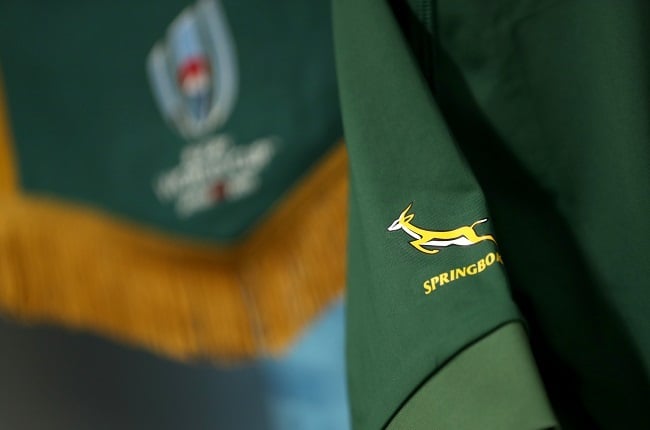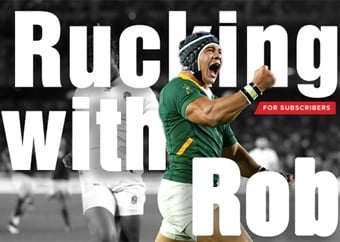
- Former Bok lock and businessman Schalk Burger Snr has ignited a spirited debate over the SA Rugby's discussions with firms with regards to a potential private equity transaction.
- The 65-year-old's reservations are based on speculation that a direct stake in the Springboks might be sold, essentially privatising a team 'owned by the people'.
- Former Springbok assistant coach Rudy Joubert, however, argues a private investor won't tinker with a strong Springbok brand if it's the factor that made it invest in the first place.
"I don't believe we'll have to worry about that."
That is former Springbok assistant coach and SA Rugby coaching manager Rudy Joubert's succinct view on reservations that the Springbok brand will suffer if SA Rugby attracts investment in the form of an equity stake from a private entity.
The thorny and divisive issue reared its head on Wednesday following a report by Netwerk24 quoting former Springbok lock Schalk Burger Snr, who believes the national team's identity is a "sovereign and unique" property that should be "owned by the people".
The 65-year-old, nowadays a successful winemaker and businessman, candidly told Sport24 on Thursday that his initial comments seemed to ignite a spirited debate.
"It would seem there is a conversation about this," said Burger.
"Obviously I have my view on this and others might hold a different one, but it's a really important debate we need to have."
His argument centres on speculation that SA Rugby discussions with potential equity partners could lead to a direct investment in the governing body's biggest commercial property, the Springboks.
Schalk Burger Snr with Luke Donald during 2018's Alfred Dunhill Links Championship. (Gallo Images)
"How on earth would something like that work? The Springbok brand is noble, it comprises the whole of South Africa - the players, fans and the country. There's no way you can compile a prospectus based on that," said Burger, who is one of the early pioneers in facilitating private equity transactions for the Boland Rugby Union years ago.
"Privatising a national team is a thought that just doesn't sit right. That shareholder can easily start dictating how the Springboks should be represented as a commercial entity and in what competitions the teams should be playing in. Would a profit motive still translate the game's best interests being taken to heart?"
Should such a scenario materialise, SA Rugby - a federation that technically doesn't have an official business arm anymore - would need to establish a company containing the national team as a commercial entity.
Joubert believes the argument that private investment will lead to the national governing body abolishing a 115-year legacy is premature and possibly alarmist if the absences of any concrete details.
"If a private company wanted to invest in SA Rugby they would surely do so on the basis of how strong the Springbok brand is," he told Sport24.
"The Boks are the governing body's biggest commercial property. Why would you want to tinker with the brand if it's the exact reason why someone would invest? Arguing otherwise wouldn't make much sense."
READ | 'Rugby people still make rugby decisions' - debunking myths of private equity
Jurie Roux, SA Rugby's CEO, previously stated that equity partners don't enter agreements for the sake of changing the core ethos and operations of a team or federation.
"I think equity partners won't initially have much (influence on competition structures and team matters)," he said last year.
"Their influence normally comes over time in terms of development of your commercial models. With all of the equity transactions that I know of and the information at my disposal, they have a minority stake in commercial rights. Obviously that can influence your commercial decisions.
"The rugby decisions in almost all of those deals sits with a separate committee. The holders are still the unions and federations.
"However, when you get to those decisions and the commercial value for a six-team Currie Cup is R100m and politically people want to have a 12-team Currie Cup and you get R10m from that, the decision becomes very easy.
"That's how equity partners would influence competition decisions. But they still don't have the veto of how you play your competitions or how you run the business of rugby."
SA Rugby has made no secret of the fact that it is exploring new streams of income, with Roux confirming previously too that "we are in discussions with private equity companies".
However, the federation has not once made any reference to that business partner being the widely speculated CVC Capital Partners.
"All these negotiations are subject to confidentiality agreements. There will be no commentary on what may or may not be happening and on the opinion of observers," SA Rugby told Sport24.
In fact, much of that speculation stems from CVC acquiring a 28% stake in PRO Rugby in 2020, the competition South Africa's four Super Rugby franchises will participate in later this year.
Last month, the company also announced a £365 million investment in the Six Nations.
Negative sentiments towards private investment in the game isn't confined to South Africa.
New Zealand Rugby is dealing with a backlash from leading players such as All Blacks captain, Sam Cane, who are concerned selling a 15% stake - which amounts to $324 million - to Silver Lake, an American investment company, would lead to a "cultural practices and understandings" being undermined.
Rudy Joubert, left. (Facebook)
But Joubert, who is in the unique position of having worked with the Springboks in the amateur and professional era, argues the constrained economic environment SA Rugby operates in means there's simply no other choice but to attract private capital.
"I've been a director of rugby. It's tough out there," South Africa's technical adviser at the 1995 World Cup said.
"I just can't see how the local game is going to remain financially sustainable if we don't find alternative income streams.
"It's important to understand that equity partners, in most instances, invest in a team or competition because it's commercially attractive and that attractiveness comes from the existing brand.
"Equity partners provide worth through expertise such as improved corporate governance, but companies who are serious about such agreements won't interfere with the rugby side of things."
Burger wholeheartedly agrees with the need for additional capital, but notes such investment should be confined to competitions and the franchises.
"It just makes sense. If you invest in a competition, you have something tangible. You can derive revenue from it," he said.
"Our franchises are privately-owned and that's appropriate too. But the Springboks should be elevated from that. It's a nation's pride that shouldn't be toyed with."













